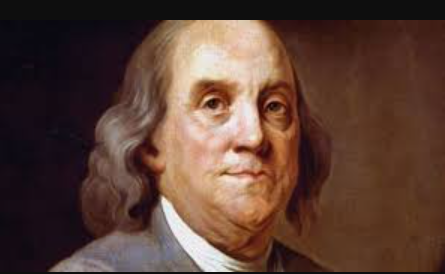Benjamin Franklin: Founding Father, Inventor, and Visionary

Benjamin Franklin, one of the most influential figures in American history, was a founding father, an inventor, a diplomat, and a leading figure in the American Enlightenment. Known for his wit, intelligence, and contributions across various fields, Franklin’s legacy endures in American culture, science, and politics. From his inventions to his work in establishing the United States, Franklin’s life was a testament to curiosity, hard work, and a dedication to public service.
Early Life and Education
Born on January 17, 1706, in Boston, Massachusetts, Franklin was the fifteenth of seventeen children in a modest family. His formal education ended at age 10 when he had to leave school to work in his father’s candle and soap business. Despite his limited schooling, Franklin was a voracious reader and self-educated himself in multiple subjects, including science, philosophy, and mathematics.
In his teenage years, Franklin became an apprentice to his brother James, a printer. This experience fueled his love for writing and publishing, eventually leading him to write under the pseudonym “Silence Dogood,” where he critiqued social issues through satire. At 17, Franklin left Boston for Philadelphia, which would become his lifelong home and the hub of his many endeavors.
The Printer and Writer
In Philadelphia, Franklin began his career as a printer and eventually established his own printing house. His publication, the Pennsylvania Gazette, became one of the most successful newspapers in the colonies, and his influence grew as he used it to express his opinions on various topics.
One of Franklin’s most famous publications, Poor Richard’s Almanack, first appeared in 1732. Filled with witty aphorisms, proverbs, and practical advice, the almanac reflected Franklin’s humor, philosophy, and values. Many of his famous sayings, like “A penny saved is a penny earned” and “Early to bed, early to rise, makes a man healthy, wealthy, and wise,” originated in Poor Richard’s Almanack, making it a popular staple among American households for decades.
Scientific Achievements and Inventions
Franklin’s curiosity extended beyond printing and writing; he was an avid scientist and inventor. His experiments in electricity were groundbreaking. In 1752, his famous kite experiment demonstrated that lightning is a form of electricity, leading to his invention of the lightning rod. This discovery was instrumental in protecting buildings from lightning strikes, reducing fire-related incidents in urban areas.
Franklin’s contributions to science and innovation did not stop with electricity. He invented bifocal glasses, which allowed people to see both near and far distances in the same lens, and the Franklin stove, an efficient heating device that reduced wood consumption and provided better heating. Franklin also contributed to oceanography by charting the Gulf Stream, improving transatlantic navigation.
Political Career and Role in the American Revolution
While Franklin’s contributions to science and literature are impressive, his political career and role in the founding of the United States are perhaps his most enduring legacy. Franklin served as the colonial representative in Britain and used his position to advocate for colonial rights and self-governance. When tensions rose between the American colonies and Britain, Franklin played a significant role in uniting the colonies and pushing for independence.
In 1776, Franklin was appointed to the Committee of Five that drafted the Declaration of Independence. His signature on the Declaration made him one of the founding fathers of the United States. He also traveled to France to secure support for the Revolutionary War, successfully persuading the French to join the fight for American independence. His diplomacy was instrumental in achieving victory, and his efforts earned him widespread admiration both in the colonies and abroad.
The U.S. Constitution and Franklin’s Legacy
After the Revolutionary War, Franklin continued to shape the new nation. In 1787, at the age of 81, Franklin was the oldest delegate at the Constitutional Convention. Although his health was declining, he played a crucial role in fostering compromise among the delegates. He supported the Constitution’s ratification and famously remarked, “I consent to this Constitution because I expect no better, and because I am not sure that it is not the best.”
Franklin’s influence extended to various social reforms as well. He was a vocal opponent of slavery and served as the president of the Pennsylvania Society for Promoting the Abolition of Slavery. He also believed in the importance of public education and libraries and founded the first public library in America, the Library Company of Philadelphia.
Franklin’s Impact on American Society
Benjamin Franklin’s contributions extend far beyond his lifetime. He is remembered for his ingenuity, curiosity, and dedication to public service. Many of his ideas and institutions — such as libraries, fire departments, and universities — are cornerstones of American society today. His work in diplomacy helped establish the United States as a respected nation on the global stage, and his inventions and scientific discoveries set the foundation for future advancements.
Franklin’s life serves as a reminder of the power of curiosity, self-education, and civic responsibility. His writings continue to inspire, and his legacy lives on through the institutions he helped establish and the ideas he championed.
Conclusion
Benjamin Franklin’s life was a journey of constant learning and contribution, characterized by his unrelenting curiosity and commitment to improving society. Whether through his groundbreaking experiments, his role in shaping the nation, or his moral teachings, Franklin’s impact on American history is profound and far-reaching. His story is an inspiring testament to the value of hard work, creativity, and civic duty — ideals that remain essential in shaping societies today.


